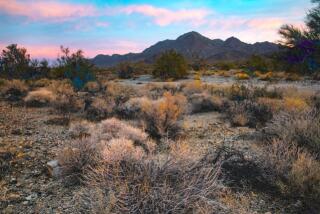Democrats Get Unlikely Allies in Protecting Western Lands
- Share via
WASHINGTON — Last fall, Republican Rep. Scott McInnis was grumbling about “ivory tower bureaucrats” wanting to impose new restrictions on a tract of government land dotted with Indian ruins in his western Colorado district.
Interior Secretary Bruce Babbitt had warned that he might ask President Clinton to declare the arid swath of canyons and mesas a national monument--which could threaten plans for natural gas or carbon dioxide drilling, cattle grazing or off-road vehicle use.
So in February, McInnis and Sen. Ben Nighthorse Campbell (R-Colo.) introduced bills to create the 164,000-acre Canyons of the Ancients National Conservation Area on that land. The plan would allow natural gas and carbon dioxide drilling to continue but would ban mining and restrict off-road vehicle use.
Western Republicans once were reliable opponents of new restrictions on federal land use, arguing that new limits on logging, mining, grazing or recreation would hurt the people who maketheir living that way. But now, GOP lawmakers in the West are sponsoring plans to buy or protect millions of acres in their home states.
One big reason: President Clinton can unilaterally lock up federal lands by declaring them national monuments, and he’s not afraid to use that power. Clinton has created three new monuments and expanded a fourth in Arizona and California this year, and Babbitt has said that he will recommend more monuments if Congress does not act to protect several other areas.
“Babbitt has a point” about Canyons of the Ancients, McInnis said. “He’s concerned about future preservation and I’m willing to compromise on that.”
Environmentalists Wary
Other Western Republicans are sharing that willingness to compromise, which heartens environmentalists who nonetheless remain wary.
“There’s a lot of potential for protecting some special areas this year,” said Melanie Griffin of the Sierra Club. “But it’s going to be a long year, because there are a lot of people who don’t want to see these victories move forward.”
Some land plans backed by Republicans include:
* A plan by California Rep. Mary Bono to create the 272,000-acre Santa Rosa and San Jacinto Mountains National Monument near Palm Springs. Babbitt said last month that Bono’s bill did not go far enough to protect the area and would risk a presidential veto if passed in its current form.
* A proposal to declare about 2.4 million acres of wilderness on federal land in Utah sponsored by Rep. James V. Hansen, whose district includes much of that land. Wilderness is the strictest federal land designation, prohibiting nearly every human activity except non-motorized uses such as hiking or cross-country skiing. Environmentalists have criticized the proposal as inadequate for protecting all Utah areas with wilderness potential.
* A bill by Arizona Rep. Jim Kolbe to create the 207,000-acre Las Cienegas National Conservation Area southeast of Tucson. Under Kolbe’s plan, new restrictions would apply only to about 50,000 acres in the area that are already owned by the federal government.
But no one has been more prolific than McInnis, who last year took up a cause started by Campbell and helped push through legislation creating the Black Canyon of the Gunnison National Park in west-central Colorado.
Other bills written or co-sponsored by McInnis would add protection to 140,000 acres of dry canyonlands next to Colorado National Monument near Grand Junction; create the 18,000-acre Spanish Peaks Wilderness near La Veta; and expand the Sand Dunes National Monument near Alamosa and upgrade it to a national park.
‘Local Level’ Touted
McInnis also has strongly criticized Babbitt and the Clinton administration for other land protections, particularly the 1996 designation of the 1.7-million-acre Grand Staircase-Escalante National Monument in Utah. McInnis said his land-protection plans are driven by local desires, not by Washington political concerns.
“We start at the local level. We build a consensus at the local level. . . . We’re not going out and seizing [land],” McInnis said.
McInnis and several GOP colleagues cite another reason for the recent shift toward more land protection: Their voters want it.
“I think Coloradans want to have a balance,” said Sen. Wayne Allard (R-Colo.). “Private property rights and private ownership, that’s important, but I think Coloradans are also concerned about what their state’s going to look like 20 years down the road. They don’t want to see everything developed up.”
Tensions also have eased somewhat between Babbitt and GOP lawmakers who have criticized the Clinton administration for making land-use rules through executive actions rather than consulting with Congress.
“This is a tough thing to say if you want to get reelected in [my] district, but we’ve had some constructive conversations with Babbitt,” McInnis said. “We can’t ignore him, but I think for the first time he understands he can’t ignore us. That’s what’s brought us both to the table, and I think we’re moving in a positive direction.”
Babbitt joked at a House Resources subcommittee meeting last month that some Westerners “advise their neighbors to batten down the hatches and protect their firstborn” when he comes to town. He said he prefers to have Congress make land-preservation decisions, but added that he is prepared to ask Clinton to act to protect some areas if Congress does not.
“I believe we can work these issues out. I believe congressional designation is the right way to go,” Babbitt said.
*
On the Net:
Bureau of Land Management: www.blm.gov/
Rep. Scott McInnis: www.house.gov/mcinnis/
Site discussing the area covered by the Canyons of the Ancients proposal: www.co.blm.gov/mdo/acecmeets.htm
*
CODE FOR WESTERN LIVING
University’s guidebook offers recommendations for those residing in the West. B3
More to Read
Sign up for Essential California
The most important California stories and recommendations in your inbox every morning.
You may occasionally receive promotional content from the Los Angeles Times.










